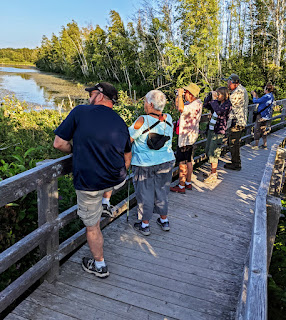NATURE MONCTON INFORMATION LINE, August 18, 2021 (Wednesday)
To respond by e-mail, please address
your message to the information line editor, nelsonpoirier435@gmail.com .
Please advise the editor at nelsonpoirier435@gmail.com if any
errors are noted in wording or photo labelling.
For more information on Nature Moncton, check the website at www.naturemoncton.com .
Edited by: Nelson Poirier nelsonpoirier435@gmail.com
Transcript by: Brian Stone bjpstone@gmail.com
Info Line # 506-384-6397 (384-NEWS)
** Another great series of photos from
Mac Wilmot’s grandson Andy Stultz taken from a helicopter based on the
icebreaker Louis S. St-Laurent over Victoria Strait in the Arctic Ocean of POLAR BEARS on the ice floes. These
photos were taken on Monday, Aug. 16. Many of us tend to think of Polar Bears as
being on land at this moment being unable to get to their seal diet but these
photos clearly show that this is not always the case as it is in Churchill,
Manitoba at this time. This group of bears would obviously have more foraging
opportunity and it is mid-August. Take a look at Andy’s great lineup of Polar
Bear action photos at the link below:
https://photos.app.goo.gl/r8e2KvUAhEN4uRs5A
** Jane Leblanc got a nice photo of a BLUE-HEADED VIREO that dropped by her
St. Martins yard. The blue-grey hood and spectacles show nicely.
** On Saturday Angela and Atilla Fust
opened their deck umbrella in Sainte-Marie-de-Kent when a bat dropped to the
deck. They thought it was dead but then noted the ears moving. They got a brush
and pan to move it into a shaded area when it suddenly flew off.
Don McAlpine reviewed the photos and
was able to identify the bat as a BIG
BROWN BAT, a species that has been increasing in range and abundance in New
Brunswick for the past 20 or more years probably related to milder winters.
They do not overwinter in caves so are not as impacted by White-Nose Syndrome
but are still susceptible.
** Brian Coyle photographed a JACK-IN-THE-PULPIT developing its berry
cluster on August 14. The berry cluster which is green now will become scarlet
red when mature.
Brian also got a photo of a BOBOLINK on Saturday. On checking with
Gilles Belliveau their age and gender may be challenging at the moment as some
males may have molted out of their breeding plumage to resemble females.
**Jan Tingley comments there are sandpipers at Hopewell Rocks in
large numbers. She was there on Saturday and Sunday to see them. They are down at the foot of the road to the left in the private property. Before or after high tide is best. The kayakers make them nervous.
If
interested one would have to go in through the main gate. The only people with
road access at this time of year are the kayakers upon application.
** The Tuesday evening Nature Moncton
outing took place at the Sackville Waterfowl Park led by Louise Nichols. It was
a pleasant walk in good company with great weather and many points of interest
along the way. GREATER YELLOWLEGS were
present in several areas along with MALLARDS and AMERICAN WIGEONS.
CEDAR WAXWINGS were in the trees and the waxing gibbous MOON hovered
near the horizon. YELLOW TOADFLAX AKA BUTTER-AND-EGGS and HIMALAYAN
BALSAM flowers lined the trails in spots. (Editor’s note: Himalayan Balsam
is a non-native plant first appearing in Saint John and thought to come from
Europe in the ballast of ships)
More photos from Tuesday night’s outing
will appear over the next few days.
Nelson Poirier,
Nature Moncton
















